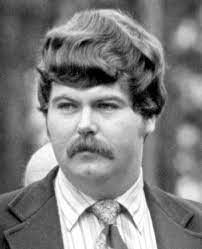John Peoples was executed by the State of Alabama for a triple murder
According to court documents John Peoples and his cousin would go to the victim home in order to buy a classic car. When the owner refused Peoples would murder Paul and Judy Franklin and their 10 year old son Paul
John Peoples would be arrested, convicted and sentenced to death
John Peoples would be executed by lethal injection on September 22 2005
John Peoples Photos

John Peoples FAQ
When Was John Peoples Executed
John Peoples was executed on September 22 2005
John Peoples Case
Condemned inmate John W. Peoples Jr. flashed a broad grin and gave a thumbs up to his brother before he was executed Thursday for killing a Pell City family of three and driving off in their vintage sports car in 1983. Peoples, 48, of Talladega, died at 6:27 p.m. CST. He was convicted in December 1983 in the killing of Pell City businessman Paul G. Franklin and his wife, Judy Choron Franklin, both 34, and their 10-year-old son, Paul.
Officials at Holman Prison near Atmore conducted the execution by lethal injection after the U.S. Supreme Court denied Peoples’ request for a delay and Gov. Bob Riley turned down his bid for clemency.
Peoples did not look at or offer an apology to relatives of the Franklins, instead thanking his own family for their support. “I hope I’ve handled everything since I’ve been here with dignity,” he said in his final statement as he faced his brother, Gerry Peoples.
The Franklins’ relatives said they were relieved that Peoples was executed, but were surprised at his apparent lack of remorse. “Seemed a lot easier on him the way he died versus the way they died,” said Bill Choron, Judy Choron Franklin’s brother.
Peoples ate very little in the days before the execution and did not make the traditional request for a last meal, prisons spokesman Brian Corbett said. Peoples spent Thursday morning visiting with several relatives, including his mother, two daughters and son. He left $186.19 to his brother.
In the final days leading up to his execution, Peoples argued that he had a right to die by electrocution, as his original death sentence stipulated, instead of lethal injection, a method Alabama adopted beginning July 1, 2002. He contended there never was a public court proceeding changing the sentence. The state, in its response to the Supreme Court, said Peoples missed the 2002 deadline to request the electric chair. “He has offered absolutely no justification for the delay,” said Assistant Attorney General Beth Hughes in her rebuttal filed Wednesday. State’s attorneys also said his sentence — death — was not changed and that his claim was without merit.
The Franklin boy and his mother were beaten to death with a rifle, but the father’s body was too decomposed by the time he was found for investigators to determine the cause of death. Prosecutors say Peoples killed the three because he wanted their 1968 red Corvette, and he was arrested after attempting to sell the car shortly after the killings. Peoples had argued that because he led investigators to the bodies, his attorney should have taken steps to get him a sentence less than the death penalty.
Evidence showed that Judy Franklin wrote Peoples’ name on the top of a clothes hamper with an eyebrow pencil before she and her son were abducted. Peoples’ cousin, Timothy Gooden, also testified in a plea deal which got him a life sentence with the possibility of parole. Gooden, who initially testified that he was with Peoples the night of the killings, later claimed investigators pressured him into testifying falsely against Peoples. Gooden was re-indicted for capital murder and, after pleading guilty, sentenced to life without parole.
Last week, relatives of Gooden presented prison Commissioner Donal Campbell with a letter from Peoples in which he insists Gooden was never with him the night of the murders. Peoples’ letter, while apparently not asserting his own innocence, says in part that District Attorney Robert Rumsey knew Gooden was not there but still made a deal with Gooden to testify against Peoples.
Relatives of the Franklins had said they did not care if Peoples died by electrocution or lethal injection. Peoples was the fourth death row inmate to die this year and the tenth since the state switched to lethal injection.
http://www.tuscaloosanews.com/apps/pbcs.dll/article?AID=/20050922/APN/509220927









